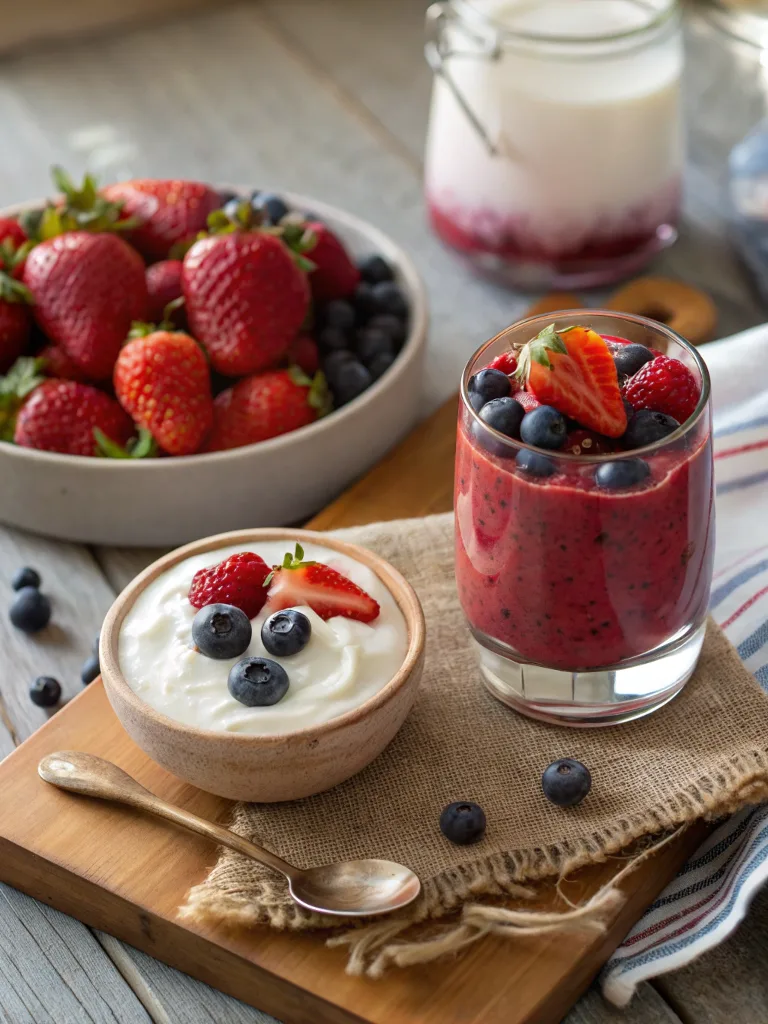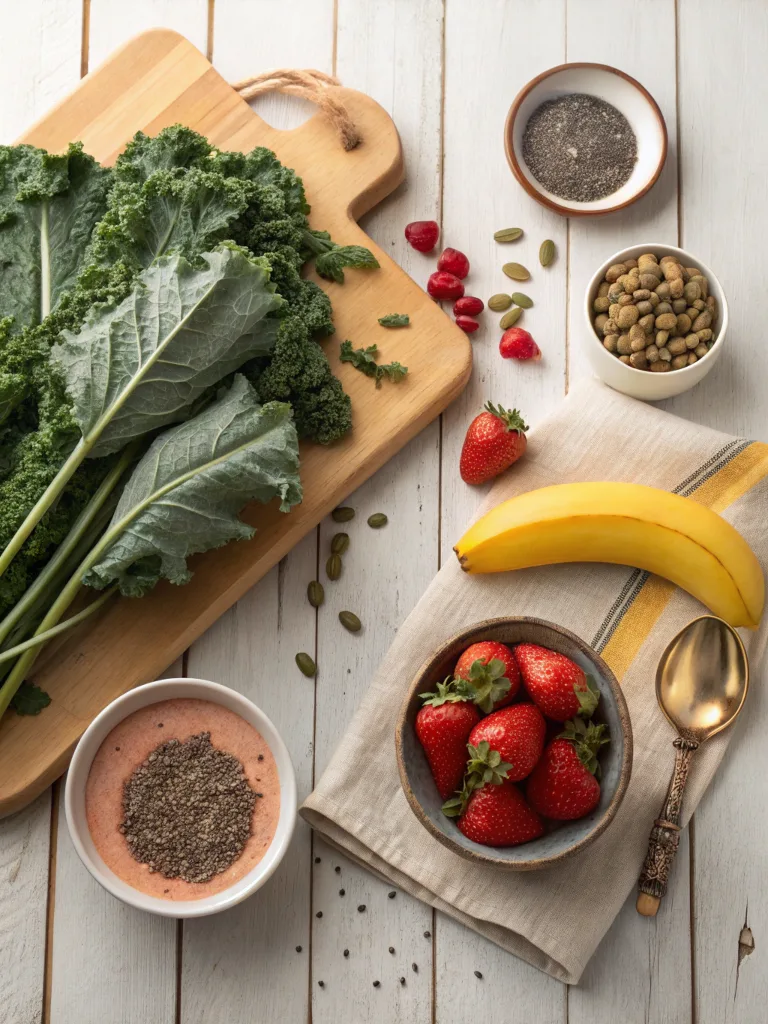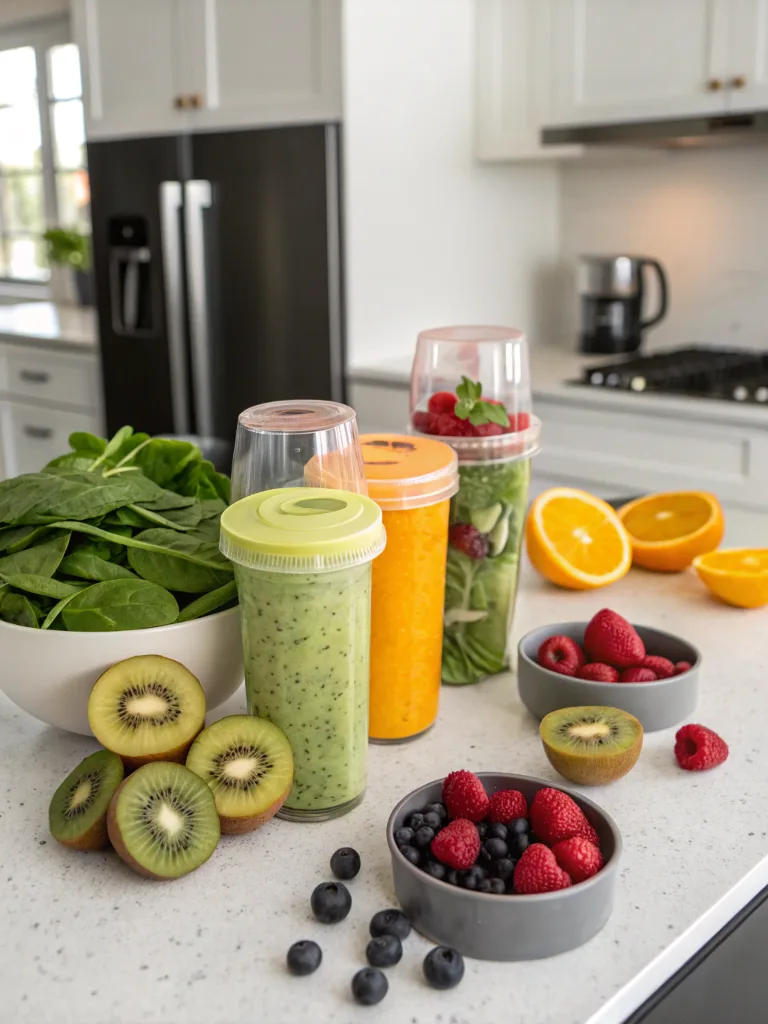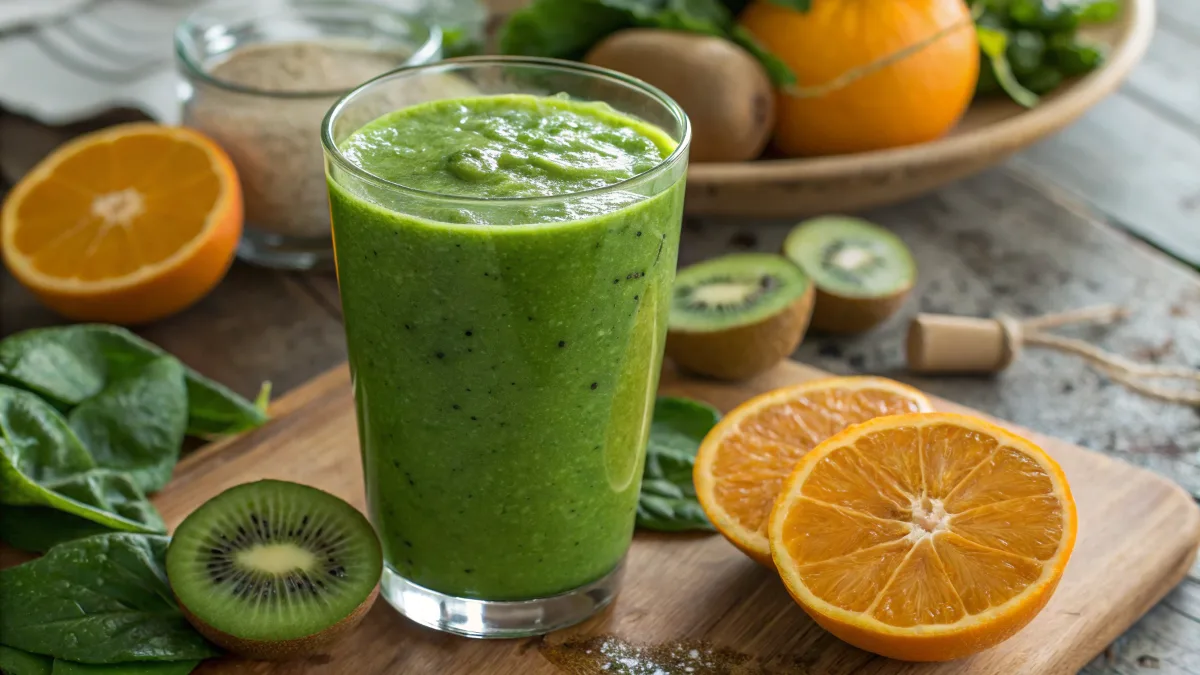How does smoothie nutrients help with vitamin C is a question more people are asking as the connection between whole-food nutrition and immune health becomes clearer. Smoothies have evolved from trendy beverages into nutrient-dense powerhouses that can play a key role in your daily vitamin intake—especially when it comes to vitamin C. This essential nutrient supports everything from immune defense to skin health, and getting it from real foods is often more effective than relying on supplements. But how does smoothie nutrients help with vitamin C in a way that’s actually beneficial to your body? In this article, we’ll break down the science, benefits, and best practices behind smoothies and their role in boosting your vitamin C levels naturally.
Table of Contents
Understanding Vitamin C and Its Role in the Body
What Is Vitamin C and Why Is It Important?
How does smoothie nutrients help with vitamin C? To answer that, we need to first understand what vitamin C actually is. Also known as ascorbic acid, vitamin C is a water-soluble nutrient that supports some of the most vital processes in your body. It plays a major role in collagen production, wound healing, iron absorption, and maintaining healthy skin and blood vessels. Notably, it also acts as a powerful antioxidant, protecting cells from oxidative damage caused by free radicals.
Unlike many animals, humans can’t produce their own vitamin C. That means you have to get it from your diet. One of the easiest, tastiest, and most effective ways to do that is by incorporating smoothies packed with fruits and vegetables into your daily routine. Smoothies allow you to combine multiple nutrient-dense foods into one power-packed drink that delivers a healthy dose of vitamin C.
So again, how does smoothie nutrients help with vitamin C? By providing natural, food-based sources of this vitamin, smoothies support better absorption and biological effectiveness than many synthetic supplements.
The Science Behind Vitamin C Absorption in the Human Body
The process of absorbing vitamin C is surprisingly complex. When you consume foods rich in vitamin C, your small intestine uses specific sodium-dependent transporters to bring the nutrient into your bloodstream. From there, vitamin C is distributed to various tissues, where it supports cellular function, collagen synthesis, and immune responses.
But here’s the thing: vitamin C absorption depends heavily on your overall diet. If you’re not consuming enough supporting nutrients—or if your gut health is compromised—your body may not use the vitamin C you ingest as efficiently. That’s where smoothies come into play.
When asking, how does smoothie nutrients help with vitamin C, it’s important to consider how blending ingredients like citrus fruits, kiwi, and spinach together not only delivers vitamin C but also supports its absorption by pairing it with complementary nutrients like magnesium and iron. These combinations create a nutrient synergy that helps your body fully utilize the vitamin C you’re consuming.
Pair your smoothie with our Breakfast Turkey Burger for extra fuel.
Add flavor to your meals with this Gravy Tomato Sauce recipe.
How Does Smoothie Nutrients Help With Vitamin C Absorption Naturally
How Nutrient-Rich Smoothies Enhance Vitamin C Uptake

So, how does smoothie nutrients help with vitamin C uptake specifically? It comes down to the way these drinks combine multiple vitamins, minerals, enzymes, and fibers into one digestible form. Smoothies often contain fruits like strawberries, oranges, pineapple, and mango—all rich in vitamin C. But more than that, they also include ingredients like spinach, chia seeds, and almond butter, which support digestive health and metabolic function.
This whole-food combination improves how vitamin C is absorbed and used by the body. Unlike supplements, which usually offer isolated nutrients, smoothies deliver vitamin C in a complete food matrix. This improves bioavailability—the rate at which nutrients are absorbed and utilized.
Here’s a quick breakdown of common smoothie ingredients and their benefits for vitamin C absorption:
| Smoothie Combo | Vitamin C Source | Supporting Nutrients | Vitamin C Uptake |
|---|---|---|---|
| Citrus + Kale | Oranges, Grapefruit | Iron, Magnesium | Very High |
| Berry + Spinach | Strawberries, Raspberries | Folate, Fiber | High |
| Mango + Banana | Mango | B6, Magnesium | Moderate to High |
| Kiwi + Chia | Kiwi | Omega-3, Fiber | High |
By blending whole foods into smoothies, you’re not just adding vitamin C—you’re creating an ideal environment for that vitamin to function effectively.
Key Nutrients in Smoothies That Help with Vitamin C Function
As we continue to explore how does smoothie nutrients help with vitamin C, we need to look at the nutrients that directly support its function in the body. These include:
- Iron: When paired with vitamin C, non-heme iron (from plant sources) becomes easier to absorb.
- Magnesium: Helps regulate hundreds of biochemical reactions, including those involving vitamin C.
- Potassium: Found in bananas and oranges, it supports hydration and cellular health.
- Fiber: Improves gut health, allowing better nutrient absorption overall.
These nutrients are often found in the same smoothies that contain vitamin C, reinforcing the idea that whole-food combinations are key to maximizing the nutrient’s potential.
How Does Smoothie Nutrients Help With Vitamin C When Paired With Other Nutrients
Top Nutrients That Maximize Vitamin C Efficiency
If you’re still wondering how does smoothie nutrients help with vitamin C, it’s time to talk about nutrient synergy. Vitamin C works best when it’s paired with nutrients that either boost its absorption or enhance its function inside the body.
Here are the most important ones:
| Nutrient | Function with Vitamin C | Smoothie Sources |
|---|---|---|
| Iron | Boosts absorption of plant-based iron | Spinach, Kale |
| Zinc | Supports immunity alongside vitamin C | Pumpkin Seeds, Oats |
| Magnesium | Activates vitamin-related enzymes | Bananas, Almond Milk |
| Flavonoids | Enhances antioxidant activity | Blueberries, Citrus Peel |
| Probiotics | Supports gut health | Greek Yogurt, Kefir |
Including these nutrients in your smoothies is one of the smartest and easiest ways to improve how your body uses vitamin C.
How Nutrient Synergy Works with Vitamin C in Smoothies
Nutrient synergy is the backbone of why smoothies are so effective. Blending a banana with strawberries, adding a handful of kale, and topping it off with almond milk does more than taste good—it creates a powerful nutritional combination.
Smoothies deliver vitamin C in its most functional form—complete with enzymes, fiber, and phytonutrients that help the vitamin work better inside your body. When you ask, how does smoothie nutrients help with vitamin C, the answer lies in this nutritional teamwork. Everything from the fiber in berries to the healthy fats in avocado contributes to the body’s ability to process and benefit from vitamin C.
Explore our smoothie recipes without yogurt for a dairy-free nutrient boost.
Fruit smoothies no yogurt offer a vitamin C-rich alternative for sensitive diets.
A smoothie meal replacement can offer a fast, healthy source of vitamin C.
The Immune Boosting Benefits of Vitamin C Through Smoothies
How Smoothies Help Vitamin C Support Immunity

Vitamin C is one of the most studied nutrients for immune health, and with good reason. It boosts the production and activity of white blood cells, which are your body’s front-line defense against viruses and bacteria. It also strengthens skin barriers and reduces inflammation.
When you drink a smoothie filled with ingredients like kiwi, spinach, lemon, and strawberries, you’re delivering an immune-supporting cocktail that can help your body fend off illness. Plus, because smoothies are typically made with raw fruits and vegetables, they retain a higher level of vitamin C than cooked foods.
So, how does smoothie nutrients help with vitamin C and immunity? Simple. They ensure you’re getting the vitamin in its most active, unprocessed form—along with nutrients that make your immune system even stronger.
Smoothie-Based Strategies to Strengthen the Immune System Naturally
If you want to use smoothies to build immune strength, try these strategies:
- Use Raw, Vitamin C-Rich Fruits: Such as kiwi, guava, oranges, and strawberries.
- Add Leafy Greens: Like kale or Swiss chard, which offer iron, calcium, and other immune-supportive minerals.
- Include Healthy Fats: From nuts, seeds, or avocado to improve vitamin retention.
- Boost with Extras: Like ginger, turmeric, or kefir to further support immune function.
By following these principles, you’re not just enjoying a tasty treat—you’re reinforcing your body’s natural defenses with each sip.
Nutrient Combinations That Work Best With Vitamin C
Pairing Vitamin C with Iron, Zinc, and Other Nutrients

Let’s break down one of the most powerful benefits of smoothies: nutrient synergy with vitamin C. When asking how does smoothie nutrients help with vitamin C, this section provides the perfect answer.
Vitamin C improves the body’s ability to absorb iron—particularly the type found in plant-based foods. This makes combinations like spinach and orange juice, or kale and strawberries, extremely valuable. The vitamin converts non-heme iron into a form that’s easier for your body to take in.
Zinc is another powerhouse. Found in ingredients like pumpkin seeds or oats, zinc works with vitamin C to boost immunity and aid in tissue repair. These two nutrients are more effective together than alone.
Here are smoothie combos that leverage this synergy:
| Smoothie Combo | Why It Works |
|---|---|
| Spinach + Orange + Banana | Vitamin C + Iron + Magnesium |
| Pumpkin Seeds + Kiwi | Zinc + Vitamin C |
| Mango + Greek Yogurt | Vitamin C + Probiotics for gut and immune health |
| Avocado + Strawberry | Healthy fats + Vitamin C + Antioxidants |
What to Avoid: Nutrients That May Block Vitamin C Absorption
Not every ingredient plays nicely with vitamin C. Some compounds can actually block or reduce absorption. If you’re serious about getting the most from your smoothies, you’ll want to avoid:
| Problem Ingredient | Why It’s a Concern |
|---|---|
| Wheat bran (raw) | Contains phytates that inhibit mineral absorption |
| Calcium supplements | May interfere with vitamin C absorption |
| Excess dairy | Can dilute nutrient concentration |
| Alcohol | Reduces gut absorption of vitamins and minerals |
Staying mindful of these blockers is just as important as adding the right nutrients. When done right, smoothies become a nutrient-absorption machine.
How Does Smoothie Nutrients Help With Vitamin C Better Than Supplements
Why Whole-Food Nutrients from Smoothies Work Better Than Pills
When it comes to meeting your daily vitamin C needs, many people reach for a supplement bottle. But here’s a question worth asking—how does smoothie nutrients help with vitamin C compared to isolated pills? The truth is, food-based nutrients, especially those from smoothies, outperform supplements in both effectiveness and safety.
Vitamin C supplements often contain synthetic ascorbic acid, which may lack the full spectrum of enzymes, phytonutrients, and cofactors needed for optimal absorption. On the other hand, smoothies deliver vitamin C in its natural form, embedded within whole fruits and vegetables. This “food matrix” ensures that your body not only recognizes but efficiently uses the vitamin C you consume.
Furthermore, supplements can cause gastrointestinal distress in some people when taken in high doses. Smoothies, on the other hand, are gentler on the stomach because their nutrients are balanced by fiber, water, and natural sugars.
Let’s break it down:
| Form | Source | Absorption | Pros | Cons |
|---|---|---|---|---|
| Smoothie Nutrients | Whole fruits and veggies | Higher (natural synergy) | Provides enzymes, fiber, and hydration | Requires preparation |
| Supplements | Synthetic ascorbic acid | Lower (often isolated) | Convenient, portable | May lack cofactors; can irritate gut |
In short, if you’re still wondering how does smoothie nutrients help with vitamin C, remember this: smoothies offer a whole-body, bioavailable approach that simply can’t be matched by pills.
Natural Bioavailability: Smoothie Nutrients vs. Isolated Vitamin C
The concept of bioavailability is key here—it refers to how well your body absorbs and uses a nutrient. Smoothies, rich in vitamin C and synergistic nutrients, provide a highly bioavailable source of this essential vitamin. Unlike pills, where vitamin C is isolated from its natural environment, smoothie nutrients work together to ensure your body actually uses what you consume.
Vitamin C in strawberries, for example, comes with flavonoids that help transport the nutrient into your cells. Kiwi and papaya offer enzymes that aid in breaking down other nutrients and improve vitamin C digestion. This interconnectedness is why smoothies aren’t just food—they’re functional nutrition.
Real Food Sources of Vitamin C in Smoothies
Top Fruits and Veggies Packed With Vitamin C
To get the most from your smoothies, it’s important to know which ingredients are highest in vitamin C. Surprisingly, oranges aren’t the only stars here. Many fruits and vegetables contain even more vitamin C per serving—and they blend beautifully into smoothies.
Here are some of the best sources:
| Ingredient | Vitamin C (mg/100g) | Smoothie Tip |
|---|---|---|
| Kakadu Plum | 3,000+ | Rare but ultra-concentrated booster |
| Guava | 228 | Blend with pineapple for tropical flavor |
| Kiwi | 93 | Pairs well with spinach and banana |
| Strawberries | 59 | Classic berry base for any smoothie |
| Orange | 53 | Adds sweetness and hydration |
| Broccoli | 89 | Great for green detox blends |
| Kale | 120 | Nutrient-rich base, balances citrus well |
| Bell Pepper | 128 | Adds crunch and works in savory smoothies |
If you ever doubt how does smoothie nutrients help with vitamin C, just consider how many different vitamin C-rich foods can go into one single blend. This variety supports not only vitamin C intake but also fiber, antioxidants, and anti-inflammatory compounds.
Nutritional Value Chart of Common Smoothie Ingredients
Below is a chart summarizing the vitamin C content of commonly used smoothie ingredients, making it easier to plan your recipes.
| Smoothie Ingredient | Vitamin C Content | Additional Benefits |
|---|---|---|
| Pineapple | High | Digestive enzymes, natural sweetness |
| Papaya | Very High | Fiber, antioxidants, skin health |
| Spinach | Moderate | Iron, folate, magnesium |
| Mango | Moderate | Beta-carotene, hydration |
| Blueberries | Low | Antioxidants, brain health |
| Lemon Juice | High | pH balance, liver detox support |
Combining these smartly is how smoothie nutrients help with vitamin C—consistently and naturally.
Common Myths About Smoothies and Vitamin C
Does Blending Kill Vitamin C? Debunking the Myths
One of the most popular myths floating around is that blending destroys vitamin C. While it’s true that vitamin C is heat-sensitive and can degrade when exposed to light or oxygen for extended periods, the act of blending itself isn’t enough to destroy significant amounts.
In fact, when you prepare and drink your smoothie fresh, the loss is negligible. Modern blenders work quickly and don’t generate enough heat to degrade vitamin C at any noticeable level. The bigger risk is in storing smoothies for too long—especially if they’re exposed to light.
So if you’re still skeptical about how does smoothie nutrients help with vitamin C, rest assured: blending actually helps unlock nutrients by breaking down tough plant cell walls, making them easier for your body to absorb.
Cold vs. Warm Smoothies: Impact on Nutrient Retention
While most people enjoy smoothies cold, some trends have introduced “warm smoothies” or room-temperature blends. Does temperature affect vitamin C?
Yes—but not dramatically. Vitamin C begins to degrade at temperatures above 70°C (158°F), so unless you’re heating your smoothie on a stove, you’re not likely to lose much. Cold smoothies tend to preserve nutrients better over time, especially if stored in opaque containers in the fridge.
Whether warm or cold, fresh smoothies maintain a significant amount of vitamin C—especially when you drink them shortly after blending. That’s just another reason why how does smoothie nutrients help with vitamin C is more than a trend—it’s a science-backed strategy for better health.
How to Build a Vitamin C-Boosting Smoothie Routine
Daily Smoothie Ideas to Hit Your Vitamin C Goals

To optimize your intake of vitamin C, consistency is key. You don’t need to overload every smoothie with citrus, but incorporating just one or two vitamin C-rich ingredients can make a huge difference over time.
Here are some go-to combinations to add to your daily or weekly rotation:
| Smoothie Name | Key Ingredients | Benefits |
|---|---|---|
| Citrus Green Boost | Kale, Orange, Pineapple | Immunity, energy, digestion |
| Tropical Sunrise | Mango, Guava, Banana | Skin health, hydration, digestion |
| Berry Immunity Mix | Strawberries, Blueberries, Greek Yogurt | Antioxidants, probiotics, vitamin C |
| Kiwi Cleanse | Kiwi, Cucumber, Lemon | Detox, vitamin C, hydration |
| Red Pepper Punch | Bell Pepper, Apple, Spinach | Vitamin C, iron, inflammation support |
By rotating your ingredients and focusing on variety, you’ll naturally increase vitamin C and nutrient intake throughout your week.
Timing, Storage, and Prep Tips for Vitamin-Packed Smoothies
To get the most out of your smoothies, timing and storage matter. Here are some expert-backed tips:
- Drink fresh: The fresher, the better. Vitamin C begins to degrade when exposed to oxygen.
- Use citrus early: Add lemon or lime juice to preserve freshness for a few hours.
- Store smart: If you prep in advance, use airtight glass jars and refrigerate immediately.
- Prep frozen packs: Chop ingredients in advance, freeze them, and blend when needed.
When considering how does smoothie nutrients help with vitamin C, daily habits matter just as much as the ingredients. A consistent smoothie routine will ensure that you’re fueling your body with the natural power of food-based vitamin C.
FAQs: About How Does Smoothie Nutrients Help With Vitamin C
What nutrients help absorb vitamin C?
Nutrients like magnesium, iron, and flavonoids help absorb vitamin C more efficiently. These are commonly found in leafy greens, berries, and seeds—perfect for smoothies.
How does vitamin C work with other nutrients?
Vitamin C supports the absorption of iron, regenerates vitamin E, and works synergistically with antioxidants to protect cells from damage.
Are smoothies a good way to get vitamins?
Absolutely. Smoothies allow you to combine multiple nutrient-rich foods into one drink, making it easier to consume a variety of essential vitamins, including vitamin C.
What is the function of the vitamin C nutrient?
Vitamin C is essential for collagen production, immune defense, tissue repair, and acting as a strong antioxidant to fight free radicals.
What are the nutritional benefits of vitamin C?
Vitamin C boosts immune health, enhances iron absorption, supports skin health, and reduces oxidative stress throughout the body.
How does the nutrients vitamin C affect immune function?
Vitamin C improves the performance of white blood cells, strengthens the skin barrier, and enhances the body’s natural ability to defend against pathogens.
Conclusion
So, how does smoothie nutrients help with vitamin C in a meaningful way? Smoothies are more than just a trend—they’re a nutrient-packed solution to modern wellness. When you combine fresh, vitamin C-rich fruits and veggies with supportive nutrients like iron, magnesium, and probiotics, you empower your body to absorb and use this vital vitamin to its fullest.
From boosting your immune system to enhancing skin health and energy levels, smoothie-based vitamin C delivery is efficient, enjoyable, and sustainable. Whether you’re starting your day with a citrus-kale blend or winding down with a kiwi-berry mix, your body will thank you.
Try our Smoothie King Angel Food Recipe for a classic vitamin C-rich blend.
Enjoy our Tropical Smoothie Sunrise Sunset to start your day with a fruity boost.
Experience the refreshing Sunrise Sunset Smoothie full of antioxidants.
Check out our full lineup of Smoothie King Recipes to boost your smoothie game.
The Bahama Mama Tropical Smoothie brings bold flavor with great nutrients.
- Want more daily inspiration on smoothie nutrition and wellness tips?
Follow us on Facebook for new recipe ideas, health facts, and more smoothie-powered goodness.- Pin your favorite smoothie combinations and discover fresh vitamin C-rich blends on our Pinterest board.
- Join the conversation and share how smoothie nutrients help your wellness journey — tag us on Twitter/X and let’s talk nutrients, health, and flavor.
- Still wondering if smoothies are the right choice for your vitamin intake?
Check out this in-depth guide from WebMD on whether smoothies are good for you to learn even more from a medical perspective.

